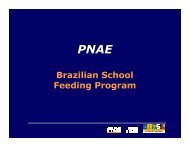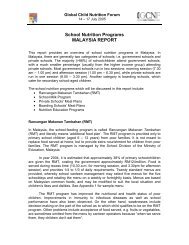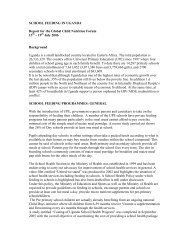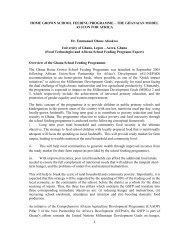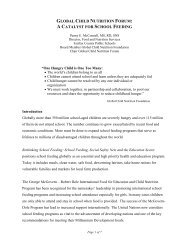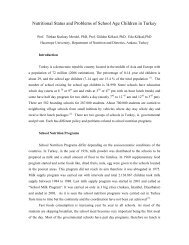EXECUTIVE SUMMARY - Global Child Nutrition Foundation
EXECUTIVE SUMMARY - Global Child Nutrition Foundation
EXECUTIVE SUMMARY - Global Child Nutrition Foundation
Create successful ePaper yourself
Turn your PDF publications into a flip-book with our unique Google optimized e-Paper software.
Scaling Up Sustainability: Linking School Feeding with Agriculture<br />
Development to Maximize Food Security<br />
May 3-7, 2011<br />
Nairobi, Kenya<br />
Country Perspectives: Policy Frameworks<br />
■ Speakers: Dr. Uwemedimo Esiet (Chair), Action Health Inc.<br />
Representatives from Mali, Madagascar, Cape Verde, Rwanda, and Malawi<br />
Overview<br />
School feeding programs are proven to improve enrollment in<br />
education. Although programs often begin as decentralized<br />
initiatives, many countries seek to develop national policies.<br />
These policies reduce program duplication, enable program<br />
monitoring and link school feeding to broader national goals.<br />
When national school feeding policies are well designed, they<br />
provide many benefits. Success depends on government buy-in<br />
and resources to handle program implementation. Sustainability<br />
is also a major challenge. Communities must play a role in the<br />
ongoing financial viability of school feeding programs.<br />
Context<br />
Representatives from Mali, Madagascar, Cape Verde, Rwanda<br />
and Malawi briefly described the school feeding policy frameworks<br />
in their countries. Chairperson Uwemedimo Esiet<br />
summarized the key messages that emerged from discussions.<br />
Key Points<br />
Sound school feeding policies have government and<br />
community backing, as well as solid implementation plans.<br />
As the delegates from Mali, Madagascar, Cape Verde,<br />
Rwanda and Malawi described their national school feeding<br />
policies, several common themes emerged.<br />
School feeding programs are a proven way to increase<br />
school enrollment. Many of the delegates commented that<br />
their governments are pursuing national school feeding<br />
policies because early initiatives were so effective at<br />
increasing enrollment.<br />
Program expense necessitates government buy-in. A<br />
recurring theme was how costly school feeding programs<br />
are to operate. As a result, national programs can only<br />
succeed if the government supports school feeding.<br />
Community support is essential for program sustainability.<br />
Several delegates noted that sustainability is one of the<br />
greatest challenges for school feeding programs. When<br />
outside financial support goes away, the community must<br />
be prepared to cover a significant portion of the costs. As<br />
a result, community education and engagement are critical.<br />
A national policy is not enough; implementation skills are<br />
also required. One delegate noted that there are “beautiful<br />
policy frameworks” for school feeding programs in Africa,<br />
but implementation is often overlooked. This was echoed by<br />
the delegate from Cape Verde who emphasized how<br />
important it is for governments to have the capacity to<br />
implement school feeding initiatives.<br />
“National policies can serve as an anchor for<br />
school feeding programs.”<br />
Uwemedimo Esiet<br />
© 2011 GCNF and PCD. All rights reserved. Page 25<br />
Mali<br />
Mali’s school feeding program is based on government<br />
support and stakeholder engagement.<br />
In the 1960s, Mali established school canteens, which<br />
significantly increased enrollment levels. By 2007, Mali<br />
achieved 80% school enrollment. This prompted the country to<br />
develop a new school feeding strategy focused on novel<br />
approaches like mobile schools. It took three years to develop<br />
this new program, during which several important lessons<br />
have been learned.<br />
Government support is essential. School feeding programs<br />
are expensive and countries may be reluctant to fund them.<br />
Initially, Mali relied on WFP support to demonstrate the<br />
benefits of school feeding to the government.<br />
All stakeholders must be engaged. After developing a<br />
school feeding action plan in 2007, Mali organized a<br />
forum with all the stakeholders, ranging from government<br />
agencies to financial and technical partners. In order to<br />
create a formal reference framework for school feeding and<br />
coordinate the various interventions, a National School<br />
Feeding policy document was elaborated—with the input<br />
of all constituents—and adopted in November 2009.<br />
Cooperation among ministries is needed. Most government<br />
ministries operate independently, and school feeding was<br />
solely the responsibility of the Ministry of Education. Now,<br />
Mali’s school feeding policy has clearly defined school<br />
feeding as multi-sectorial, and thus, actively promotes<br />
cooperation and coordination across ministries.<br />
Sustainability is the greatest challenge. Nationally run<br />
school feeding programs must be sustainable after financial<br />
partners leave. Funding must be mobilized at the<br />
community level.<br />
Madagascar<br />
Madagascar discovered that national school feeding<br />
strategies cannot be created without political will.<br />
Issues related to child malnutrition and program coordination<br />
motivated Madagascar to develop a national school feeding<br />
policy. Before the policy was implemented, most children<br />
suffered from malnutrition. In addition, hunger relief programs<br />
lacked coherence.<br />
Developing an institutional framework to coordinate school<br />
feeding interventions required political will. In 2005, the<br />
Ministry of Education created a school feeding strategy which<br />
is part of a National Action Plan. Madagascar also has a<br />
National Board of <strong>Nutrition</strong> and agencies that implement the<br />
school feeding program. The WFP provides financial support<br />
to the country’s school feeding program.



